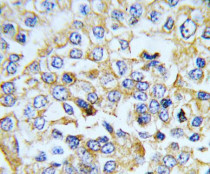ARG54865
anti-Natriuretic Peptide Receptor A antibody
anti-Natriuretic Peptide Receptor A antibody for IHC-Formalin-fixed paraffin-embedded sections and Human,Mouse,Rat
Cell Biology and Cellular Response antibody; Signaling Transduction antibody
Overview
| Product Description | Rabbit Polyclonal antibody recognizes Natriuretic Peptide Receptor A |
|---|---|
| Tested Reactivity | Hu, Ms, Rat |
| Tested Application | IHC-P |
| Host | Rabbit |
| Clonality | Polyclonal |
| Isotype | IgG |
| Target Name | Natriuretic Peptide Receptor A |
| Antigen Species | Human |
| Immunogen | KLH-conjugated synthetic peptide corresponding to aa. 1-30 (N-terminus) of Human Natriuretic Peptide Receptor A. |
| Conjugation | Un-conjugated |
| Alternate Names | ANPa; GUCY2A; GC-A; ANPRA; Atrial natriuretic peptide receptor 1; Guanylate cyclase A; NPR-A; NPRA; GUC2A; Atrial natriuretic peptide receptor type A; EC 4.6.1.2; ANP-A; ANPR-A |
Application Instructions
| Application Suggestion |
|
||||
|---|---|---|---|---|---|
| Application Note | * The dilutions indicate recommended starting dilutions and the optimal dilutions or concentrations should be determined by the scientist. |
Properties
| Form | Liquid |
|---|---|
| Purification | Purification with Protein G. |
| Buffer | PBS and 0.09% (W/V) Sodium azide |
| Preservative | 0.09% (W/V) Sodium azide |
| Storage Instruction | For continuous use, store undiluted antibody at 2-8°C for up to a week. For long-term storage, aliquot and store at -20°C or below. Storage in frost free freezers is not recommended. Avoid repeated freeze/thaw cycles. Suggest spin the vial prior to opening. The antibody solution should be gently mixed before use. |
| Note | For laboratory research only, not for drug, diagnostic or other use. |
Bioinformation
| Database Links | |
|---|---|
| Gene Symbol | NPR1 |
| Gene Full Name | natriuretic peptide receptor 1 |
| Background | Guanylyl cyclases, catalyzing the production of cGMP from GTP, are classified as soluble and membrane forms (Garbers and Lowe, 1994 [PubMed 7982997]). The membrane guanylyl cyclases, often termed guanylyl cyclases A through F, form a family of cell-surface receptors with a similar topographic structure: an extracellular ligand-binding domain, a single membrane-spanning domain, and an intracellular region that contains a protein kinase-like domain and a cyclase catalytic domain. GC-A and GC-B function as receptors for natriuretic peptides; they are also referred to as atrial natriuretic peptide receptor A (NPR1) and type B (NPR2; MIM 108961). Also see NPR3 (MIM 108962), which encodes a protein with only the ligand-binding transmembrane and 37-amino acid cytoplasmic domains. NPR1 is a membrane-bound guanylate cyclase that serves as the receptor for both atrial and brain natriuretic peptides (ANP (MIM 108780) and BNP (MIM 600295), respectively).[supplied by OMIM, May 2009] |
| Function | Receptor for the atrial natriuretic peptide NPPA/ANP and the brain natriuretic peptide NPPB/BNP which are potent vasoactive hormones playing a key role in cardiovascular homeostasis. Has guanylate cyclase activity upon binding of the ligand. [UniProt] |
| Cellular Localization | Membrane; Single-pass type I membrane protein |
| Research Area | Cell Biology and Cellular Response antibody; Signaling Transduction antibody |
| Calculated MW | 119 kDa |
| PTM | Phosphorylation of the protein kinase-like domain is required for full activation by ANP. |
Images (1) Click the Picture to Zoom In






